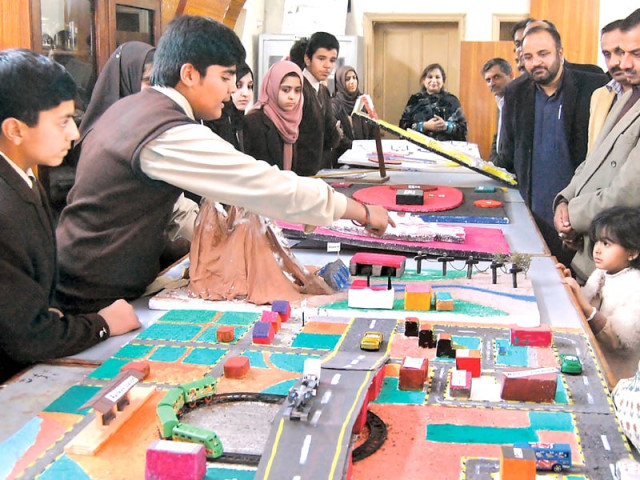Teachers, parents and students should get to know each other as people first, say educationists
More than 80 professionals from 25 schools and colleges brainstorm on interaction.

Colin Wrigley, the principal of Karachi Grammar School for the fourth time, seemed determined as he facilitated the three-day TAKE Time Out conference which kicked off at the Avari Towers on Tuesday.
More than 80 professionals from 25 schools and colleges from across the country gathered to brainstorm on the theme “School development through interaction” – chosen by the Trust for Advancement of Knowledge and Education (TAKE) which organised the conference in collaboration with the Institute of Education (IOE), University of London. This was the first of the biannual conferences that TAKE-IOE plans to hold every year. The second conference will be held in October.
The TAKE-IOE team is hoping to grant proper qualification to educators at both, personal and institutional level, over a long period of time.
The objectives of this inceptive conference were manifold, according to Wrigley, who is no stranger to Pakistan. He has lived and worked in the country for over 20 years. For him, the country’s education system is marred by a terrible waste of money, both by the government and private sector. “This is a crime in my opinion – putting money without planning,” he said. Talking about the conference, Wrigley said that first TAKE-IOE team wants to find out what the teachers think by interactive group discussions. “What is it that they want, what problems do they face and struggle with,” he said. “Then we will make the plans accordingly.”
The conference appeared to be a consortium of private sector institutions with very few registrants from the government sector. “Yes, it tends to be,” agreed Wrigley, adding that the language barrier prevents interaction with government institutions. But there are possibilities, he said. “Building capacity is the key. If we are able to get key government officials on board then we can make an impact.”
Dr Raphael Wilkins and Dr Eleanore Hargreaves flew in from London to supervise the conference. As a keynote speaker at the first day of conference, Dr Wilkins highlighted the need of working in tandem with the parents, citing Peter Coleman that the parents are ever-present actors with the teachers and students. “The beliefs, attitudes and habits of the family are thoroughly embedded in the mind of the child,” he said.
Dr Wilkins presented the Epstein model of school, which advocates the involvement of family, school and the community in education, for analysis and discussion. The method, he said, eventually results in creating school-like homes and home-like schools.
Later on in the session, Wilkins invited the participants to analyse the current situation in their organisations. It emerged that there was less active participation by parents in elite schools. “A lot of them [the parents] show a hands-off attitude,” said Tahir Manto from The International School. “Most parents see such schools as exclusive places, far from the public, which take the responsibility of their child’s future.” He added that the flow of communication between the school and parents appears to be one-sided, while the parents and teachers ought to be equally involved.
Nausheen Hammad from Beaconhouse School System presented a slightly different perspective which revealed mistakes from the schools’ side as well. Hammad said that schools keep the parents in the loop but mostly on academic issues. “The teachers hesitate to listen to emotional and social problems of their students which, if they do, will help in holistic development of the children,” she said. Even on academic matters, the schools keep the parents informed via different means. But even this communication was a one-way street because feedback of the parents was not heeded to. Hammad suggested that parents and teachers get to know each other at social events organised by the school, although not as ‘parents of so and so student’ but as individuals.’
On the other hand, Qamar Safdar, who is head of education at The Citizens Foundation (TCF) which runs around 800 schools across the country for the less privileged strata of society, said that the parents were seen to be involved in the TCF schools. “This enables us to create a strong bond between the family and the school. The children feel more secure at the institution,” she told The Express Tribune.
At the college level, the principal of St Joseph’s College for Women, Prof. Dr Bernadette L Dean, felt the need for creating a sense of independence among the students. In her college, where the number of students reaches around 1,200, Dean said that she tried to groom her students keeping a sense of intimacy between them. “I want from you what I want from my own children,” is what she told her students.
Published in The Express Tribune, March 8th, 2012.



















COMMENTS
Comments are moderated and generally will be posted if they are on-topic and not abusive.
For more information, please see our Comments FAQ